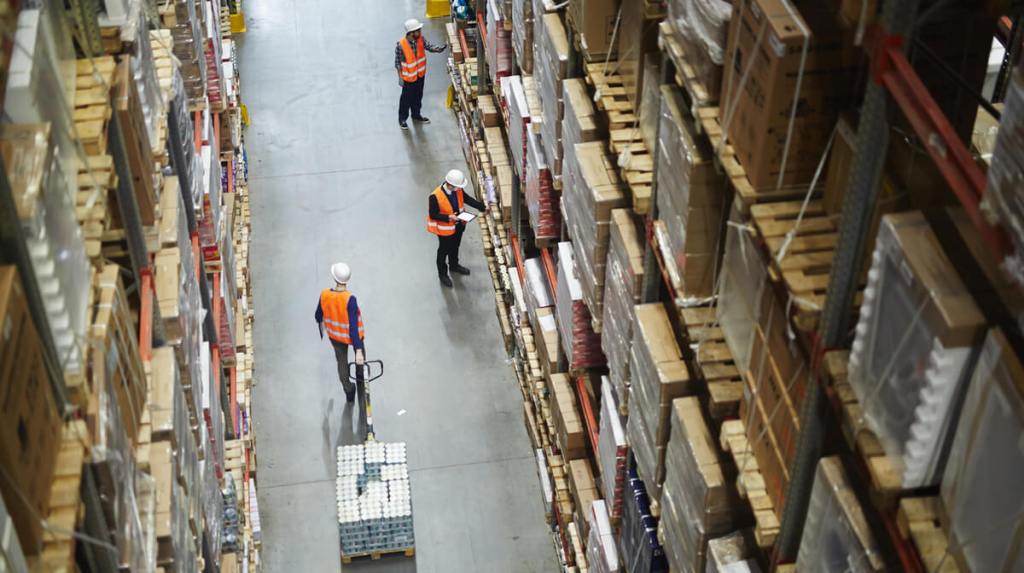Warehouse insurance
Join over 900,000 customers who’ve chosen to insure with us. Find out more about the different types of warehouse insurance we offer.

Compare quotes from leading brands






Rated 4.8/5
Based on 39,800 reviews
Claims paid in 24 hours
For 80% of settled claims
Why is warehousing insurance important?
From property damage and refrigerated stock to employers’ and public liability, warehouses face a high level of risk. Falls from a height, injuries from moving objects, trips and falls – all of these are extremely common accidents in a warehouse, and can trigger expensive claims. Your cover is built to work as a backstop, letting you focus on running the business, not everything that could go wrong.
- seasonal stock increase during specified busy trading periods
- warehouse storage insurance, cyber, theft, and assault – up to your policy limit
- options for common types of warehouse insurance (tell us what you need)
What does warehouse insurance cover?
Typically, we’ll start with property damage insurance, built to cover businesses like yours against incidents which cause damage to your building and its contents, fixtures, and fittings. Most quotes also help you build in employers’ liability insurance for your team, if you have one. From there, you can add specific cover for your warehouse, from business interruption to deterioration of refrigerated stock, depending on your business needs.
This content has been created for general information purposes. Make sure you have the right level of business insurance by checking your policy documentation for details. Read our full Terms and Conditions
Chosen by nearly 1 million small businesses and landlords
We started out as a team of five back in 2005. We’ve grown since then, with nearly 1 million customers across 1,500 trades now trusting us to provide their business insurance.
Warehousing insurance FAQ
Whether you’re new to buying business insurance or you’ve been trading for a while, here are the answers to some commonly asked questions about warehouse insurance, including what type of insurance covers inventory. You can also check out our business insurance FAQs.
This depends on your warehouse, the business you’re running, and your associated activities and contracts. An insurer will take your overall risk profile into account when building your quote, so the average warehouse insurance cost will vary between business and premises types.
If you provide other services, make sure you’re covered:
Other types of insurance
Each insurer looks at CCJs and IVAs differently – some apply stricter rules than others, but having a CCJ or IVA doesn’t necessarily mean you won’t be able to buy insurance.
You can choose the payment type that suits your business and cash flow best. Some customers prefer to pay in one go, while others prefer to pay a regular monthly amount, like you do with lots of other bills. Simply Business offer three ways to pay for your policy:
- one-off credit or debit card payment
- BACS payment
- Direct Debit
If you choose to pay by Direct Debit, our credit provider, Premium Credit, pays Simply Business the full amount for your policy up front. You then repay Premium Credit in 10 monthly instalments.
This will depend on whether you have employers’ liability insurance in place. Public liability insurance is designed to protect your business against the consequences of legal action brought by members of the public for injuries or damage to their belongings. But when it comes to your employees causing injury or damage, this protection only activates if you also have employers’ liability insurance.
If you employ people, you’re required by law to have employers’ liability insurance.
There’s one exception here. Family businesses that aren’t incorporated as a limited company are not legally required to have employers’ liability insurance. The government defines a “family business” as one where all your employees are closely related to you (as a spouse, civil partner, sibling, child, parent, grandparent, grandchild, step-parent, stepchild or half-sibling). So if you run an unincorporated family business and you choose not to get employers’ liability insurance, it’s important to know that your public liability insurance wouldn’t cover you against damage or injury caused by your team.
We create this content for general information purposes and it should not be taken as advice. Always check policy documentation for details and seek professional advice. Read our full Terms and Conditions